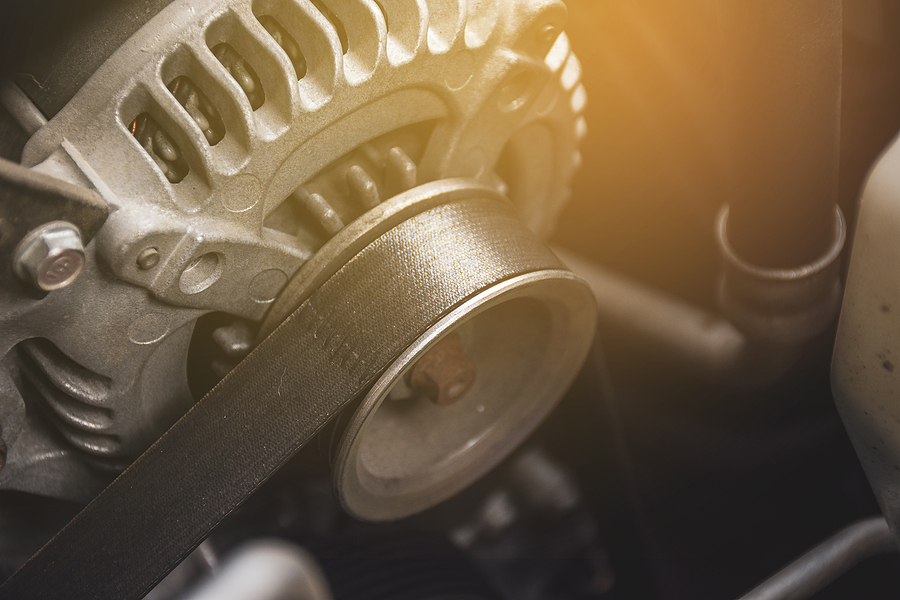Your car’s alternator is one of the unsung heroes in the vehicle’s electrical system. It’s the workhorse responsible for keeping the battery charged and the various electrical systems humming along. However, even the most reliable components can falter over time, and when your alternator starts acting up, it can spell trouble for your car’s functionality.
This comprehensive guide is designed to help car owners recognize signs of alternator issues, understand their causes, and know how to address potential problems with confidence. From dimming lights to strange noises, we’ll walk you through all the telltale signs and what to do about them, ensuring your trusty ride stays reliable on the road.

The Role of Your Car Alternator
To the uninitiated, the alternator can seem like a tiny player in the grand scheme of a car’s mechanisms. In reality, it’s a pivotal player, akin to a miniature electrical generator. When your car is running, the alternator is converting mechanical energy from the engine into AC (alternating current) electricity. This not only powers your car’s various electrical parts but also charges the battery to ensure a healthy start the next time you turn the ignition key.
The alternator also plays a secondary but significant role as a voltage regulator, ensuring the electrical systems receive the correct and constant voltage to operate efficiently. Without a properly functioning alternator, systems like the power windows, air conditioning, and even the most fundamental component—the ignition—would cease to function properly.
Signs of Alternator Problems
A failing alternator doesn’t always give up without a fight. It often exhibits several telltale signs that all is not well under the hood. Here are the most common red flags to watch out for:
Dimming Lights: If you notice your headlights or interior lights are fluctuating between bright and dim, or dimming over time, this may be due to a drop in electrical power from a failing alternator.
Strange Noises: A grinding or whining sound coming from the engine could indicate a bad alternator, usually pointing to a worn-out component within the unit.
Dashboard Warnings: Modern cars are equipped with electronic control systems that can display a variety of warning lights on the dash. If your battery-shaped light indicates a problem, the culprit could be your alternator.
Common Alternator Issues
The longevity of an alternator largely depends on the build quality and the user’s maintenance. Regardless, issues can arise. Some of the most common problems include:
Belt Problems: The alternator is usually connected to the engine components by a drive belt. If this belt becomes loose or breaks, the alternator will not spin, compromising its function.
Electrical Issues: Anything from a blown fuse to a broken wire can interrupt the flow of electricity and cause problems with the alternator. One short-circuit could spell disaster for the entire system.
Worn-Out Components: Inside the alternator, there are several parts—including the brushes, rectifier, and diode trio—that can wear out over time. Like any well-used machinery, these parts may eventually need to be replaced.
Diagnosis and Troubleshooting
Diagnosing an alternator problem requires a bit of acumen, but it can be done with the right tools and approach. Here’s what you need to know:
Testing the Alternator: A visual inspection of the alternator can often reveal simple issues such as loose connections. However, to really understand what’s going on, you may need to remove it for testing, which a professional mechanic can do.
Voltage Checks: Using a multi-meter, you can check the voltage output of the alternator when the car is running. If the reading is low or fluctuates, your alternator might be the culprit.
Multi-Meter Usage: A multi-meter is an indispensable tool for checking the charge of your car’s battery. Ensure it’s at a full charge before starting your car, and then check it after the vehicle has been running for a few minutes.
Preventive Maintenance Tips
While it’s true that some alternator issues are unforeseeable, regular maintenance can often prevent common problems. Consider these tips:
Regular Inspections: Have a mechanic check the alternator as part of your regular service intervals.
Battery Maintenance: Make sure your battery is in good condition and the connections are clean and secure. A failing unit can put undue stress on the alternator.
Belt Checks: Inspect the alternator belt for wear or damage. It should be tight and free from cracks or chips.
The Average Cost of Alternator Repair
The cost of repairing or replacing an alternator can vary from car to car, mechanic to mechanic. To get the best deal, it’s worth shopping around and getting quotes from several reputable sources.
Replacing vs. Repairing: While some parts within an alternator can be replaced individually, it’s often more cost-effective in the long run to replace the entire unit rather than continually replacing worn-out components.
Cost Considerations: Factors that can influence the cost include make and model, labor costs, and any additional parts or repairs that may be required. On average, you can expect to pay anywhere from $200 to $600 for alternator repair or replacement.
Scrap Your Car: If you cannot afford to repair or replace your alternator, you can consider scrapping your vehicle at a local auto salvage yard. Junk car buyers pay cash for all vehicles, even if they are totaled or dismantled. Got some car parts to sell? They take those too!
Conclusion
Your car’s alternator is a vital component that ensures the smooth operation of your vehicle’s electrical systems. By recognizing the signs of alternator issues and understanding the underlying problems, you empower yourself to take proactive steps to ensure your car remains dependable on the road.
Remember, addressing alternator problems promptly can prevent more significant issues not only with your electrical systems but also with other parts of your vehicle that can be affected by power supply irregularities. Stay vigilant, and don’t hesitate to consult a professional if you suspect your alternator is the culprit behind your car troubles.
Is the cost to repair your car too much? Is it more than the actual market value of your vehicle? Then it might be time to talk to our junk car buyers! Contact GC’s Junk Cars at 513-991-4776 today and we’ll provide a free, no-obligation quote for your junk car! We look forward to helping you get cash for your junk car today.
Related Posts:
Is My Car Totaled if the Speedometer is Broken?
The Average Cost to Replace a Broken Catalytic Converter
Keep an Eye Out for These 3 Common Auto Repair Shop Scams

